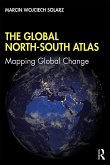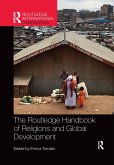Terms such as "Third World", "developing countries" and "Global South" are ubiquitous in the discipline of development studies, but they are often poorly defined, ideologically weighted and misleading.
Taking an intellectual history approach, this book examines the most commonly used spatial terms in the language of development, tracing their origins, meanings, evolution and processes of popularisation and demonstrating how geographical, political and economic concepts were used or misused in creating these terms. The book looks at the origins and the changing nature of fundamental development divisions from prehistoric times to the present day and analyses the process of conceptualising the contemporary North-South divide, focusing especially on the start of spatial development terminology in the twentieth century. It uses detailed maps to assist the reader in visualising the geographical complexities of these spatial terms, and discusses more recently developed terms, such as "emerging markets" and "BRIC", which are key to understanding the modern world.
This book provides a valuable resource for students and researchers in development studies, international relations, geography, sociology and anthropology, as well as practitioners in the field of development.
Taking an intellectual history approach, this book examines the most commonly used spatial terms in the language of development, tracing their origins, meanings, evolution and processes of popularisation and demonstrating how geographical, political and economic concepts were used or misused in creating these terms. The book looks at the origins and the changing nature of fundamental development divisions from prehistoric times to the present day and analyses the process of conceptualising the contemporary North-South divide, focusing especially on the start of spatial development terminology in the twentieth century. It uses detailed maps to assist the reader in visualising the geographical complexities of these spatial terms, and discusses more recently developed terms, such as "emerging markets" and "BRIC", which are key to understanding the modern world.
This book provides a valuable resource for students and researchers in development studies, international relations, geography, sociology and anthropology, as well as practitioners in the field of development.
"The volume is much needed for those interested in the geographies and economies of global economic development." - Geographical Education, Dr Jeana Kriewaldt, The University of Melbourne
"It provides much space for relevant concepts and views barely present in international literature on the topic. It can serve as a useful tool in university teaching in all subjects related to these problems. It can help students understand how we regionalise the world, why we are doing it the way we are, why we use these labels, and how these concepts are related to development theories. With the multilingual and multidisciplinary bibliography one can find the most important and relevant sources on global development and spatial terminology. Students and teachers in the fields of geography, development studies, politics or history can be the main public of this book, but with its easily comprehensible content and readability it is off ered for everyone interested in these issues." - Máté Farkas, Hungarian Geographical Bulletin 65 (2016) (2) 203-205.
"It provides much space for relevant concepts and views barely present in international literature on the topic. It can serve as a useful tool in university teaching in all subjects related to these problems. It can help students understand how we regionalise the world, why we are doing it the way we are, why we use these labels, and how these concepts are related to development theories. With the multilingual and multidisciplinary bibliography one can find the most important and relevant sources on global development and spatial terminology. Students and teachers in the fields of geography, development studies, politics or history can be the main public of this book, but with its easily comprehensible content and readability it is off ered for everyone interested in these issues." - Máté Farkas, Hungarian Geographical Bulletin 65 (2016) (2) 203-205.
"The volume is much needed for those interested in the geographies and economies of global economic development." - Geographical Education, Dr Jeana Kriewaldt, The University of Melbourne
"It provides much space for relevant concepts and views barely present in international literature on the topic. It can serve as a useful tool in university teaching in all subjects related to these problems. It can help students understand how we regionalise the world, why we are doing it the way we are, why we use these labels, and how these concepts are related to development theories. With the multilingual and multidisciplinary bibliography one can find the most important and relevant sources on global development and spatial terminology. Students and teachers in the fields of geography, development studies, politics or history can be the main public of this book, but with its easily comprehensible content and readability it is off ered for everyone interested in these issues." - Máté Farkas, Hungarian Geographical Bulletin 65 (2016) (2) 203-205.
"It provides much space for relevant concepts and views barely present in international literature on the topic. It can serve as a useful tool in university teaching in all subjects related to these problems. It can help students understand how we regionalise the world, why we are doing it the way we are, why we use these labels, and how these concepts are related to development theories. With the multilingual and multidisciplinary bibliography one can find the most important and relevant sources on global development and spatial terminology. Students and teachers in the fields of geography, development studies, politics or history can be the main public of this book, but with its easily comprehensible content and readability it is off ered for everyone interested in these issues." - Máté Farkas, Hungarian Geographical Bulletin 65 (2016) (2) 203-205.








